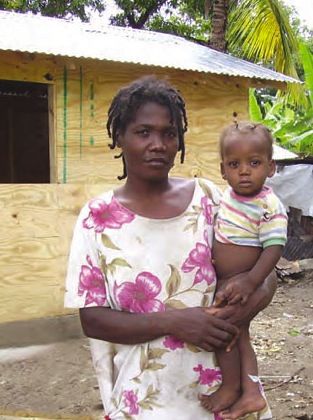New Homes and New Hope in Haiti

Ketlie is a 37-year-old single mother of five. Before last year’s earthquake, she and her children lived in a home built from locally-made bricks – her childhood home, which she had inherited from her mother. When the quake destroyed her house and many of her belongings, Ketlie rummaged for pieces of wood, tin and plastic sheeting to protect her family from the wind and rain. For months, she and her children lived in a dirt-floored, five-by-five-foot square shelter next to the ruins of their home. The family had neither a protected shower nor a latrine.
To help families like Ketlie’s, Episcopal Relief & Development is partnering with the Episcopal Diocese of Haiti and its relief and development arm, CEDDISEC (Centre Diocésain de Développement Intégré et de Secours) to build provisional homes in areas that sustained severe quake damage. The current goal is to build 200 homes for families whose houses were destroyed, with a priority on housing for families headed by single mothers like Ketlie. Workers have already completed 145 homes, and construction will carry on through the coming year.
Ketlie was one of the first five recipients of a provisional home, with a raised foundation, reinforced wooden walls and a tin roof to keep the rain out. The homes are small but sturdy, and are meant to last at least three years. Homeowners can either add to and fortify the current structures, or use the materials to build something new. Provisional homes come with an outdoor shower and latrine, improving health and hygiene. To protect against malaria and other insect-borne diseases, families are also given two long-lasting insecticide-treated nets to use inside the house.
The construction of provisional homes is one part of the Diocese of Haiti and CEDDISEC’s work to provide shelter for people who found themselves homeless after the earthquake. Tents and insecticide-treated tarps were also distributed to families through local parish networks. In addition, CEDDISEC worked to distribute food and clean water to tent camps, and provided health care through mobile clinics. Although pockets of emergency need remain, most of CEDDISEC’s work has shifted from relief to recovery and sustainable development. Home construction will proceed through 2011 and likely into 2012, along with Cash-for-Work projects and continued rehabilitation of the water and sanitation systems in select areas around the country.
So far, over 100,000 people have been served by the relief and recovery programs of CEDDISEC and the Diocese of Haiti. Reflecting on the magnitude of the Church’s response to the devastation in Haiti, The Rt. Rev. Jean Zaché Duracin, Bishop of Haiti, writes: “As we look back, we take pride in that number and in what we have been able to do for those within our churches and for whole communities. We also take pride in what those within our churches and our communities have done for one another. This past year the Episcopal Diocese of Haiti has called people to action, so that together all may work to make Haiti rise up and move forward.”
“The approach we are able to take in Haiti, by virtue of our long-standing relationship with the Haitian Church, greatly increases local participation and ensures that the work will have a lasting impact,” says Tammi Mott, Program Officer for Episcopal Relief & Development. “When a community bands together to restore what was destroyed, the total effect is more than just the sum of the work put in – it also renews feelings of trust and hope, unity and wholeness.”
This renewal can be seen in the areas where people are starting to rebuild their homes and lives, and it is also personally felt by those who are experiencing new beginnings with the help of CEDDISEC and the Church.
When asked about her new home, Ketlie quoted a Creole proverb that relates the difference in her life to that of the back and front doors of a house. Before, she said, she felt like the back door, which is old and broken and hidden from people’s eyes. Now, she feels like the front door, which is shiny and strong for the world to see.
Episcopal Relief & Development has been partnering with the Episcopal Diocese of Haiti for many years, supporting the diocese’s development work and lending additional help in times of extreme need. This relationship is what allowed Episcopal Relief & Development to respond quickly and effectively to last year’s earthquake. Since the earthquake, Episcopal Relief & Development has offered operational and program support to the Diocese of Haiti and CEDDISEC, helping them to serve people in communities throughout the quake zone. To learn more about Episcopal Relief & Development’s response to the Haiti earthquake, please visit https://www.episcopalrelief.org/Haiti. The organization’s one-year report on its Haiti response is downloadable here.
Separately, The Episcopal Church has launched a church-wide appeal, coordinated by the Episcopal Church Foundation, to begin to rebuild the Church in Haiti, beginning with the Holy Trinity Cathedral complex. For more information on this campaign, please visit http://www.episcopalchurch.org/HaitiAppeal.


